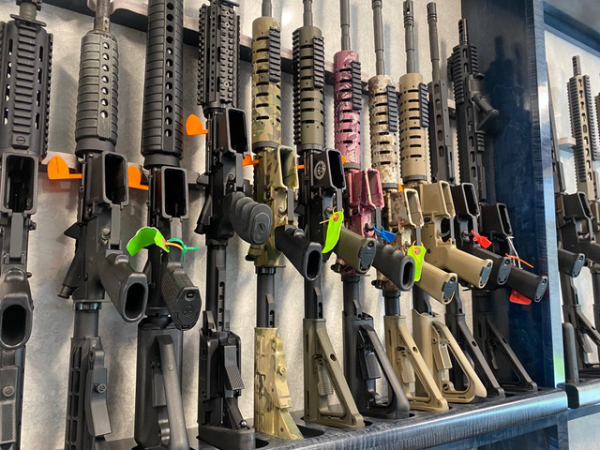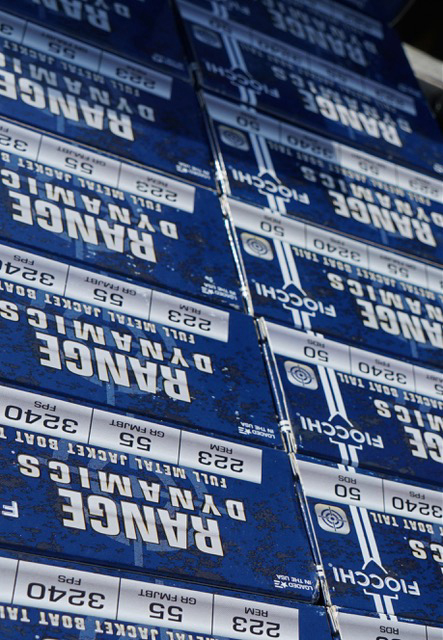It’s tough to be in business these days, whether you’re a manufacturer, distributor or retailer.
The supply chain’s stretched thin.
There’s no such thing as truly “fixed” costs for estimating budgets. There are considerably more jobs than workers willing to fill them.
Every business in the country faces these challenges. If you’re in the gun or ammunition businesses, however, your life is even more complicated.

Banks are increasingly refusing to do take/keep your business. Credit card processors are refusing to run your charges, and delivery companies are apparently doing their parts to make certain your life is as difficult as possible.
If that’s not enough, factor in politicians passing laws they already know won’t pass “superficial scrutiny” in the courts, much less the “strict scrutiny” the Supreme Court has said is the standard for laws restricting the Second Amendment rights of citizens.
California, for example, has passed a law that ignores the national Protection of Lawful Commerce in Firearms Law. California’s AB 1594 allows “state, local governments and Californians to sue irresponsible gunmakers for the harm caused by their products.”
Then there’s AB 2571, the law which prohibits marketing of firearms to minors and, of course, AB 1621-the bill that “further restricts” ghost guns.
None of these should pass muster in federal courts -even in the Ninth Circuit where gun haters once counted on the “nutty Ninth” to uphold virtually any restriction. Today, there’s no longer the assurance that laws would be ignored for societal norms.
But legality, unfortunately, doesn’t seem to have been the point of these laws.
They were designed to drive guns -and gun businesses- out of California. As if anyone in the industry needed to be reminded.
Imagine, for a minute, that you’re the CEO of a gun company that supports one of the many youth shooting sports groups- and they have chapters in California. Does supporting them constitute marketing to minors? How about the discounts on applicable products you offer those organizations?
How about sending email to existing gun owners? If they live in California and you let them know about special prices to those groups have you inadvertently marketed to youths?
Might seem like a no harm/no foul situation, but that’s not the case. Each violation carries a potential fine of $25,000. Not per (mass) mailing; per recipient. Accidentally send an email to 100 people who have the a longstanding email address, but currently reside in California and you’re looking at a potential fine of $2.5 million dollars.
“But,” some will counter, “you’re going to the extreme here.”
Wish I were. But I’m not.
There’s only one way to look at this kind of business risk: the a worst-case scenario.
After all, this isn’t a business issue, it’s an ideological divide. California’s political majority doesn’t want guns available to anyone. And they’re doing everything in their power to make that a reality. And they’re willing to spend taxpayer money -including the taxes paid by law-abiding gun owners- to make their dream come true.
In the near future, it won’t be unreasonable to see gun companies adapt the same type of “digital fences” liquor manufacturers use to keep minors off their websites. When you type in a company’s web address, you’ll be greeted with a “splash screen” that will tell you that to go any further you’ll have to provide information that proves you’re “of age of legal consent” to own a firearm in your state, and then provide a verifiable address to back your assertion.
Without those assurances, it would be irresponsible of gun companies to let you go any further. Even with them, there’s no assurance that some entity won’t decide to sue using the argument that the prohibition attracted youths to the website. The “forbidden fruit” argument sounds ridiculous, unless you read psychological studies that explain that say “being too restrictive can make the forbidden more desirable to kids.”
Sounds crazy..until you remember Prohibition created an unprecedented demand for alcohol.

Having ammunition remains a concern. But getting it delivered to customers seems to be yet another rock in the retail backpack.
|
We’re working on trying to verify another story working its way through the industry. Some independent retailers and small manufacturers are telling me they’re experiencing a very difficult time with deliveries. Not just timelines, although one retailer told me (yesterday) that a personal purchase he made from one of the largest online retailers didn’t arrive on time after he paid for express delivery. When it didn’t arrive after a week, he got a refund for his purchase. Fifteen days later, his package was delivered, with no explanation of where it had been for two weeks.
This was the latest anecdotal report I’ve gotten describing UPS as a “problem”. But it’s not the only one.
One small online retailer (unnamed at their request) told me as many as five percent of their shipments via UPS have “disappeared” recently. When shipped in the combination of UPS and the postal service, those already alarming numbers doubled.
Consequently, they’re now only shipping packages containing ammunition or firearms related parts insured and priority.
The gun business has never been as described by anti-gun groups. There are no drive-up windows for guns or ammunition, and the ATF rules were not to be ignored before the Biden Administration’s ridiculous zero-tolerance policy was enacted.
Today, it’s even more challenging.
As always, we’ll keep you posted.
— Jim Shepherd